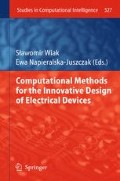Abstract
The manufacturers are tempted to reduce the amount of active materials in the devices in order to lower the material bill. However, reducing the weight of the devices directly affects the energy efficiency. In this paper, a solution to this problem is proposed for the case of wound rotor synchronous generators. The trade-off between cost and efficiency is formulated as a constrained optimization problem and solved using a Genetic Algorithm. The cost optimization of three different machines is carried out through various design approaches. The proposed approach always gives better results than the classical approach concerning the global cost of the range.
Access this chapter
Tax calculation will be finalised at checkout
Purchases are for personal use only
Preview
Unable to display preview. Download preview PDF.
References
Belmans, R., De Keulenaer, H., Blaustein, E., Chapman, D., De Almeida, A., De Wachter, B., Radgen, P.: Energy Efficient Motor Driven Systems. Technical report, Motor Challenge (2004)
Kreuawan, S., Gillon, F., Brochet, P.: Optimal design of permanent magnet motor using Multidisciplinary Design Optimization. In: Proceedings of the 2008 International Conference on Electrical Machines (2008)
Legranger, J., Friedrich, G., Vivier, S., Mipo, J.-C.: Combination of Finite-Element and Analytical Models in the Optimal Multidomain Design of Machines: Application to an Interior Permanent Magnet Starter Generator. IEEE Trans. on Energy Convers (2010) doi:10.1109/TIA.2009.2036549
Bellegarde, N., Dessante, P., Vidal, P., Vannier, J.-C.: Optimisation of a drive system and its epicyclic gear set. Stud. in Comput. Intell (2008), doi:10.1007/978-3-540-78490-6_29
Li, H., Chen, Z., Polinder, H.: Optimization of Multibrid Permanent-Magnet Wind Generator Systems. IEEE Trans. on Energy Convers (2009) doi:10.1109/TEC.2008.2005279
Dessante, P., Vannier, J.-C., Rippol, C.: Optimization of a linear brushless DC motor Drive. Recent Dev. of Electr. Drives (2006), doi:10.1007/978-1-4020-4535-6_12
Candela, C., Morín, M., Blázquez, F., Platero, C.A.: Optimal Design of a Salient Poles Permanent Magnet Synchronous Motor Using Geometric Programming and Finite Element Method. In: Proceedings of the 2008 International Conference on Electrical Machines (2008)
Kano, Y., Matsui, N.: A Design Approach for Direct-Drive Permanent-Magnet Motor. IEEE Trans. on Industry Appl (2008), doi:10.1109/TIA.2008.916600
Schätzer, C., Müller, W., Binder, A.: Vector optimization of two-dimensional numerical field problems applied to the design of a wind turbine generator. Math. and Comput. in Siml (1999), doi:10.1016/S0378-4754(99)00012-9
Jung, H., Lee, C.-G., Hahn, S.-C., Jung, S.-Y.: Optimal Design of Direct-Driven PM Wind Generator Applying Parallel Computing Genetic Algorithm. In: Proceeding of the 2007 International Conference on Electrical Machines and Systems (2007)
Methods for Determining Losses and Efficiency of Rotating Electrical Machinery from Tests (Excluding Machines for Traction Vehicles), IEC 34-2 (1972)
Zitzler, E., Deb, K., Thiele, L.: Comparison of multiobjective evolutionary algorithms: Empirical results. Evol. Comput (2000), doi:10.1162/106365600568202
Deb, K., Pratab, A., Agrawal, S., Meyarivan, T.: A fast elitist non-dominated sorting genetic algorithm for multi-objective optimization: NSGA II. IEEE Trans. On Evol. Comput. (2002), doi:10.1109/4235.996017
Erickson, M., Mayer, A., Horn, J.: The niched pareto genetic algorithm 2 applied to the design of groundwater remediation systems. In: Evol. Multi-Criterion Optim. Springer, Heidelberg (2001), doi:10.1007/3-540-44719-9_48
Zitzler, E., Laumanns, M., Thiele, L.: Spea2: Improving the strength pareto evolutionary algorithm, Tech. Rep., Swiss Federal Institute of Technology (ETH), Zurich, Switzerland (2001)
Dréo, J., Petrowski, A., Taillard, E., Siarry, P.: Metaheuristics for Hard Optimization. Springer Editions, Paris (2006)
Lebesnerais, J., Lanfranchi, V., Hecquet, M., Brochet, P.: Mixed-variable multi-objective optimization of induction machines including noise minimization. IEEE Trans. on Magn (2008), doi:10.1109/TMAG.2007.916173
Author information
Authors and Affiliations
Editor information
Editors and Affiliations
Rights and permissions
Copyright information
© 2010 Springer-Verlag Berlin Heidelberg
About this chapter
Cite this chapter
Jannot, X., Dessante, P., Vidal, P., Vannier, JC. (2010). Optimization of Wound Rotor Synchronous Generators Based on Genetic Algorithms. In: Wiak, S., Napieralska-Juszczak, E. (eds) Computational Methods for the Innovative Design of Electrical Devices. Studies in Computational Intelligence, vol 327. Springer, Berlin, Heidelberg. https://doi.org/10.1007/978-3-642-16225-1_5
Download citation
DOI: https://doi.org/10.1007/978-3-642-16225-1_5
Publisher Name: Springer, Berlin, Heidelberg
Print ISBN: 978-3-642-16224-4
Online ISBN: 978-3-642-16225-1
eBook Packages: EngineeringEngineering (R0)

